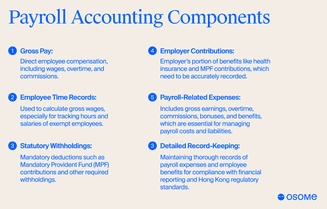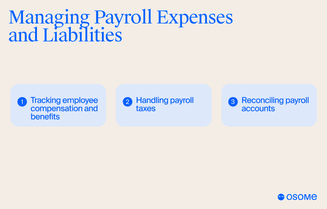What Is Payroll Accounting: Essentials, Benefits, and Best Practices
- Published: 15 November 2024
- 13 min read
- Running a Business


Heather Cameron
Author
Heather is here to inform and inspire our readers. Boasting eight years in the world of digital marketing, working in diverse industries like finance and travel, she has experience writing for various audiences. As Osome’s resident copywriter, Heather crafts compelling content, including expert guides, helpful accounting tips, and insights into the latest fintech trends that will help entrepreneurs, founders and small business owners in Hong Kong take their businesses to the next level.

Sherman Ieong
Reviewer
Sherman Ieong is our Accounting & Tax Manager based in Hong Kong. She is on hand to help our writers level-up our blog posts and guides by making sure the information is accurate, informative and inspiring. Osome’s all-in-one accounting services make managing tax effortless - and that’s exactly what Sherman ensures we do with our Hong Kong-focused blog content, applying her knowledge of day-to-day bookkeeping, monthly financial reporting, Profits Tax Returns and much more.
Payroll accounting tracks employee compensation, benefits, and related taxes, ensuring accurate payments and compliance with laws. It’s crucial for business financial health and legal adherence. This article covers the basics, key components, setup process, and common challenges of payroll accounting.
Key Takeaways
- Payroll accounting tracks compensations, payroll taxes, and expenses, ensuring compliance and accurate financial records.
- Key components include gross pay calculations, withholdings, and maintenance of detailed payroll records to support effective financial management.
- Implementing payroll software can enhance accuracy, reduce processing time, and improve cost efficiency, aiding compliance with tax and labour regulations.
What Is Payroll Accounting?
Payroll accounting is a method for tracking employee compensation and related payroll taxes and expenses. It involves calculating, managing, and analysing compensation with associated benefits and statutory deductions. This essential function records payroll-related expenses such as employees' wages, social security payments, benefit costs, and contributions to the Mandatory Provident Fund (MPF), ensuring that businesses maintain accurate and compliant financial records.
A professional accounting service can streamline this complex process, ensuring accuracy in recording payroll expenses such as wages, benefit costs, and tax obligations. With expert support, businesses gain clarity on financial obligations and confidence in compliance, allowing them to focus on growth while staying ahead in a dynamic regulatory environment.
Key Components of Payroll Accounting
The backbone of payroll accounting consists of several key components. Gross pay, which includes direct compensation and additional earnings such as overtime and commissions. Gross wages are calculated using employee time records and take into account the salaries of exempt employees. Crucial to this process are various statutory withholdings, such as MPF contributions and other applicable deductions, which are subtracted from the employee’s gross pay. Additionally, employer contributions for benefits like health insurance and the MPF need to be calculated and recorded.

Typical payroll-related expenses include gross earnings, overtime, commissions, bonuses, and benefits. Managing these components effectively ensures accounting accuracy and helps businesses keep track of payroll costs, employee expenses, and liabilities. Maintaining detailed records of payroll expenses and employee benefits supports streamlined reporting and compliance with Hong Kong's regulatory requirements.
Types of Payroll Accounting Entries
Payroll accounting involves various types of payroll accounting entries to accurately record employee payouts and related expenses. The initial payroll accounting entry includes the total gross wages along with any applicable payroll withholdings. This entry is crucial for capturing the full cost of employee compensation within the accounting period when the work was performed, regardless of when the payment is actually made. This approach helps recognise accrued wages and ensure that financial statements reflect the company’s true financial position.
In addition to regular payroll entries, businesses may also need to process manual payments to address corrections or adjustments to employee compensation. These manual payments are generally processed outside the usual payroll system but must be accurately recorded to maintain the integrity of payroll accounts.
Understanding the different types of payroll accounting entries ensures comprehensive and accurate payroll records, supporting effective financial management.
Setting Up a Payroll Accounting System
A robust payroll accounting system is essential for any business in Hong Kong. It provides a clear picture of employee expenses and ensures compliance with tax and labour regulations. The first step is identifying the main items needed for payroll accounting, along with collecting essential documents. New businesses should incorporate payroll expense accounts and payroll liability accounts in their chart of accounts, and establish clear payroll policies and procedures to facilitate efficient processing.
Accurate recording of payroll-related transactions in the general ledger is vital for maintaining transparency and compliance with reporting standards. This section will cover the key steps for setting up a payroll accounting system in Hong Kong, including obtaining a Business Registration Certificate, creating a chart of accounts, and implementing payroll software.
1 Obtaining a Business Registration Certificate
To hire and pay employees in Hong Kong, companies must obtain a Business Registration Certificate from the Company Registry.
In Hong Kong, companies are required to declare their employees' remuneration by filing employment returns.
2 Creating a chart of accounts
Creating a comprehensive chart of accounts is a critical step in payroll accounting. Payroll expense accounts should detail all costs associated with employee compensation, including wages, benefits, and payroll taxes. Additionally, opening a dedicated bank account to pay payroll can help streamline the payment process and improve financial management.
Accurately categorising payroll expenses and liabilities helps maintain better control over payroll-related finances and reporting.
3 Implementing payroll software
Implementing payroll software can significantly enhance the payroll accounting process. Payroll software automates many tasks, reducing the time taken for calculations and payments and minimising the risk of human error. This software integrates seamlessly with other accounting systems, improving overall payroll efficiency and accuracy. It also helps generate payroll liability balance reports so you can record payroll via adjusted journal entries after paying employees.
Moreover, payroll software securely stores payslips and annual reports, making them easily accessible for both employees and employers. Leveraging payroll software ensures accurate payroll accounting, streamlines operations, and enhances data security.
Payroll Processing Steps
The payroll accounting process involves several crucial steps to ensure accurate and timely employee payments. These steps include company setup and employee onboarding, which are essential for accurate payroll management.
1 Collecting timekeeping information
Accurate hourly employee time logs ensure sufficient and appropriate payments. On the other hand, while a salaried employee is not affected by hours logged, they may still earn overtime pay for any additional hours worked. This data forms the foundation for calculating compensation and must be meticulously recorded to avoid discrepancies and ensure a trustworthy relationship for both the employee and the employer.
2 Calculating gross pay and net pay
Different pay structures can introduce complexities in calculating gross earnings.
Multiply hours worked in the payroll period by the hourly rate to calculate gross pay for hourly employees. Gross earnings refer to the total amount earned before any withholdings or deductions are applied. For salaried employees, the gross is your employee's annual salary divided by twelve (or more, depending on payroll schedule), plus any bonuses or commissions within that pay period. Simplify these calculations with a payroll solution that integrates with your time recording systems, ensuring that all earnings are accurately accounted for.
Next, calculate net pay. Net pay is the final amount paid to an employee after all deductions, including employee costs, payroll taxes, contribution for unemployment taxes, retirement contributions, health insurance premiums, dues, and garnishments, have been subtracted from the gross pay. Costs incurred by the employee include business expenses, tax contributions, benefits contributions, and penalties. Note that in Singapore, employees are responsible for paying income taxes on their end.
If this sounds complicated, there are digital tools that can generate accurate payslips for employees, reflecting their net pay and ensuring transparency in the payroll process.
3 Issuing payments and managing payroll liabilities
Payments to accounts payable in Hong Kong can be made through various methods, including paper cheques, direct deposits, payroll cards, and digital wallets. Payroll software can automate this process, ensuring timely payments are aligned with weekly, bi-weekly, or monthly pay cycles. To set up direct deposit for recurring payments, employees must submit a direct deposit authorisation form.
Employers need to monitor payroll liabilities, which represent amounts incurred but not yet paid. To avoid penalties and ensure compliance with Hong Kong’s Inland Revenue Department regulations, timely payment of these liabilities is essential.
Record liabilities in a separate account and adjust it when third-party payroll deductions are settled. This practice helps track liability changes accurately and supports precise reporting. It’s important to distinguish between the liability account, which tracks unpaid payroll obligations, and the expense account, which records all expenses and is vital for your company's balance sheet.
Managing Payroll Expenses and Liabilities
Effective management of payroll expenses and liabilities is crucial for ensuring compliance and accurate financial reporting. Payroll expenses include compensation, benefits, and other related costs. These expenses must be meticulously tracked to maintain proper financial records and manage cash flow.

Tracking employee compensation and benefits
Payment records should comply with local regulations, such as the Employment Ordinance. Common payroll liability payments include contributions to the Mandatory Provident Fund (MPF), health insurance premiums, and other relevant allowances. In Singapore, employees are required to contribute up to 20% of employee wages, with the option of making additional voluntary contributions.
Business owners in Hong Kong need to monitor payroll costs closely to manage cash flow effectively and ensure labour costs are correctly calculated. Accurate labour cost calculation is critical, as these expenses significantly affect net income.
Handling payroll taxes
Handling payroll taxes in Hong Kong requires strict adherence to compliance schedules and precise record-keeping. Employers must follow local tax obligations, including submitting tax returns through the Inland Revenue Department’s electronic filing system.
Accurate payroll tax reporting involves keeping detailed records of all contributions to the MPF, salaries tax, and other levies. Ensuring payroll records are complete and accurate is essential to meet tax obligations and prepare for audits by local authorities.
Reconciling payroll accounts
Regular reconciliation in your accounting system can ensure the accuracy of payroll records and financial reporting. This process involves matching employee-related expenses with payroll tax filings to ensure all data is accurately recorded.
Establishing a regular reconciliation schedule can greatly improve the integrity of payroll records and support overall financial health. Align reconciliation with payroll schedules to streamline the process and synch the information into your company's profit and loss statement for record keeping.
Verifying actual bank transactions further enhances the reliability of the payroll accounting process.
The Importance of Accurate Payroll Accounting
Accuracy in payroll accounting is essential for employee satisfaction and overall organisational productivity. Payroll accountants ensure that employee payments are accurate and timely and manage tax withholdings. Regularly preparing payroll reports helps monitor employee costs, comply with regulations, and improve organisational efficiency. Not conducting regular reviews of payroll might lead to costly errors that impact both finances and employee trust.
Your payroll accounting's accuracy can drastically impact business cash flow, legal compliance, and reporting efficacy.

Impact on business cash flow
Monitoring payroll expenses closely is vital for effective cash flow management. A well-defined pay structure is crucial for ensuring transparency and fairness. Different pay structures can impact employee motivation and job satisfaction.
Compliance with legal obligations
Legal compliance is fundamental for payroll accounting in Hong Kong. Employers must keep detailed records in line with local regulations, such as the Employment Ordinance, which includes maintaining accurate payroll records for all employees, including wage rates and working hours. Records should also document payments for salaries tax, contributions to the Mandatory Provident Fund (MPF), and any deductions for garnishments or union dues where applicable. These records are essential for tax reporting and for meeting compliance standards set by the Inland Revenue Department (IRD).
Keeping comprehensive records of all taxes and MPF contributions paid is crucial to avoid penalties during audits. Detailed records streamline the audit process by providing transparency and traceability during financial evaluations.
Payroll software helps organisations comply with tax and employment laws while also improving cost efficiency. Ensuring adherence to payroll regulations supports financial transparency, reduces the risk of penalties, and strengthens the integrity of financial statements.
Enhancing financial reporting
Accurate payrolls ensure that employee compensations and liabilities are correctly recorded, directly impacting business cash flow by ensuring timely and correct payments of wages and payroll taxes. Compliance with legal requirements in payroll accounting is essential to avoid penalties and maintain the integrity of financial statements.
Common Challenges in Payroll Accounting
Processing payroll accurately and promptly is essential for maintaining employee morale and trust. However, payroll accounting can present several challenges. Errors in payroll can lead to financial instability due to increased costs, such as overtime and legal fees.
This section explores common challenges in payroll accounting, including staying current with legislative changes, managing diverse pay structures, and handling payroll for remote and international employees.
Keeping up with legislative changes
Businesses in Hong Kong must regularly adapt to new tax regulations and employment regulations to ensure compliance. Frequent updates to tax and employment legislation can create compliance issues. Failure to keep up with payroll legislation can lead to costly penalties.
Continuous training for payroll staff is essential to manage evolving regulations effectively.
Managing diverse pay structures
Handling diverse pay structures adds complexity to the payroll process. Different pay types, such as hourly, salaried, and commission-based, complicate the calculations of gross earnings. Running payroll manually is prone to errors and can be challenging for businesses.
Consulting local payroll services is advisable, as understanding specific Hong Kong employment laws can be invaluable.
Payroll for remote and international employees
Payroll management for remote and international employees presents unique challenges. This requires familiarity with regulations in each location, including Hong Kong’s requirements, and understanding the varying tax obligations and liabilities in other regions. Payroll for international employees can be further complicated by differences in labour laws, income tax obligations, and international treaties that may impact payroll.
Effective payroll management for remote and international employees requires a deep understanding of diverse regulations and tax schemes across regions to ensure compliance and avoid potential legal issues from incorrect payroll processing.
Benefits of Using Payroll Accounting Software
Adopting payroll accounting software can transform payroll accounting processes. Payroll accounting software is a cloud-based solution that automates employee payments, minimising human error and enhancing accuracy. Automated payroll systems can ensure accurate payment calculations and tax deductions, streamlining payroll operations and boosting productivity within organisations.
Reducing processing time and errors
Payroll accounting software significantly reduces processing time and eliminates errors. By automating various accounting tasks, including reviews and approval workflows, payroll software allows companies to focus on other key business areas. Companies should consider switching to a digital solution when manual payroll is overwhelming or errors and noncompliance are frequent.
Automation enhances accuracy in payroll processing, ensuring that you are paying employees promptly and accurately. This not only boosts efficiency but also helps maintain employee satisfaction and trust. Combining technology with professional payroll services can help you manage payroll even more effectively.
Ensuring data security
Security payroll functions employ password protection and other security features to safeguard sensitive employee data. Protecting sensitive employee data is crucial for ensuring privacy and maintaining trust in payroll systems. Securing payroll data prevents unauthorised access and data breaches, enhancing overall security.
Cost-efficiency and compliance management
Cost-effective solutions can reduce labour hours and minimise errors in your accounting department. They also help forecast staff costs by allowing hypothetical budgets as payroll journal entries, aiding financial planning and management.
Most digital payroll solutions also aid in compliance management by ensuring accurate tax calculations and timely submissions. This helps businesses avoid penalties and maintain compliance with tax laws, further enhancing cost efficiency and operational effectiveness.
Summary
In summary, mastering payroll accounting involves understanding its key components, setting up an efficient payroll accounting system, managing expenses, and tracking payroll liabilities. Accuracy is crucial for maintaining compliance with legal obligations, enhancing reporting, and ensuring employee satisfaction. By leveraging payroll accounting software, businesses can reduce processing time and errors, ensure data security, and achieve cost-efficiency. Embrace these best practices to streamline your payroll processes and foster a more productive and compliant business environment.
If you’re ready to streamline your payroll processes and ensure compliance, Osome’s expert accounting team is here to help. Contact us today to discover how we can help your business manage payroll efficiently and stay focused on growth.






